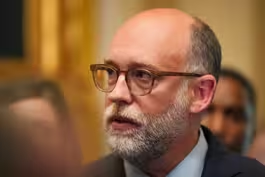
Why this shutdown is different and what Trump gets out of it
Clip: 10/3/2025 | 9m 12sVideo has Closed Captions
Why this shutdown is different and what Trump is getting out of it
At some point, the government will reopen, but the fight that has shut the government down this week is in some ways unique. For Democrats, this is the chance to show their base they have the capacity to stand up to President Trump. For Trump, this is an opportunity to punish Democrats, cut funding to blue states and fire even more federal workers.
Problems playing video? | Closed Captioning Feedback
Problems playing video? | Closed Captioning Feedback
Major funding for “Washington Week with The Atlantic” is provided by Consumer Cellular, Otsuka, Kaiser Permanente, the Yuen Foundation, and the Corporation for Public Broadcasting.

Why this shutdown is different and what Trump gets out of it
Clip: 10/3/2025 | 9m 12sVideo has Closed Captions
At some point, the government will reopen, but the fight that has shut the government down this week is in some ways unique. For Democrats, this is the chance to show their base they have the capacity to stand up to President Trump. For Trump, this is an opportunity to punish Democrats, cut funding to blue states and fire even more federal workers.
Problems playing video? | Closed Captioning Feedback
How to Watch Washington Week with The Atlantic
Washington Week with The Atlantic is available to stream on pbs.org and the free PBS App, available on iPhone, Apple TV, Android TV, Android smartphones, Amazon Fire TV, Amazon Fire Tablet, Roku, Samsung Smart TV, and Vizio.

10 big stories Washington Week covered
Washington Week came on the air February 23, 1967. In the 50 years that followed, we covered a lot of history-making events. Read up on 10 of the biggest stories Washington Week covered in its first 50 years.Providing Support for PBS.org
Learn Moreabout PBS online sponsorshipJEFFREY GOLDBERG: Even when the government is open, no one accuses Congress of being particularly productive or a well-oiled machine.
So, it's not surprising that this least effective branch of government is even more ineffective this week.
Speaker Mike Johnson has already canceled House votes for next week, which means that the government probably isn't reopening anytime soon.
Although today, I can report that the Senate's top Democrat and top Republican, Chuck Schumer and John Thune, were seen speaking for at least 34 seconds.
So, there's that.
The question tonight, why do lawmakers keep shutting down the government?
Joining me tonight to discuss this and more, Leigh Ann Caldwell is the vhief Washington correspondent for Puck News, Andrew Desiderio is a senior Congressional reporter for Punchbowl News, Toluse Olorunnipa is a staff writer at The Atlantic, and Ashley Parker covers the White House for The Atlantic.
Thank you all for joining me.
Ashley, let's go right to you.
You're a veteran White House correspondent.
What is Trump getting out of this shutdown?
ASHLEY PARKER, Staff Writer, The Atlantic: So, first, it's not necessarily something he would have chosen, but he likes a fight.
He thinks publicly gleefully that it benefits him and Republicans politically.
I think that still remains to be seen.
He's also enjoying the trolling aspect.
I know that's a weird thing to say about the president of the United States, that it was exciting to put a little sombrero on Hakeem Jeffries' hat, but he has sort of enjoyed that aspect.
JEFFREY GOLDBERG: Wait.
Remind our normie viewers what you're referring to, because not everybody saw the Hakeem Jeffries meme.
ASHLEY PARKER: Yes.
So, there was a -- it looked like A.I.-generated meme of Chuck Schumer and Hakeem Jeffries.
They were coming out and talking about a meeting and where shutdown negotiations stood, and they basically dubbed it over to have Chuck Schumer saying things like, nobody likes the Democrats, and then they doctored Hakeem Jeffries to have a little squiggly mustache and a sombrero on his head.
JEFFREY GOLDBERG: Lincoln used to do this stuff all the time.
Yes.
Anyway, go on.
I just thought maybe some people aren't -- ASHLEY PARKER: No precedent, yes.
JEFFREY GOLDBERG: Some people aren't extremely online.
Anyway, go ahead.
Sorry.
ASHLEY PARKER: So, he has enjoyed the fighting, trolling nature.
I would add one final thing, sort of this opportunity for the deconstruction of the administrative state, but I will say on that, he likes threatening Democrats, right, saying, we're going to do what Project 2025 promised.
We're going to fire all these workers.
We're going to figure out what agencies we can just eliminate forever.
It's a fun thing to say.
That's for him.
That's why I say it's trolling, but it's not quite clear that that's actually what he wants to do.
And there's some understanding within his orbit that there might be some blowback if they were actually to do that.
JEFFREY GOLDBERG: Right.
Leigh Ann, you just wrote, quote, in a way, a government shutdown is among the more normal things to occur in Washington since Donald Trump returned to the White House, certainly more normal than the U.S.
government taking stakes in private companies, or the president selling his own cryptocurrency, or the military being deployed to American cities, et cetera.
This part is all comfortingly familiar.
But, Toluse, in a piece you just wrote with Jonathan Lemire, you argued that Trump's handling of the shutdown is very different than the 2019 shutdown.
I quote, in part, 34 days into the previous government shutdown in 2019, reporters asked President Trump if he had a message for the thousands of federal employees who were about to miss another paycheck, quote, I love them.
I respect them.
I really appreciate the great job they're doing, he said at the time.
The following day, caving after weeks of punishing cable news coverage, he signed legislation to reopen the government, lauding furloughed employees as incredible patriots and so on.
And then you wrote.
It doesn't really sound like the same guy, does it?
So, Leigh Ann, Toluse, fight it out.
Like is this a normal shutdown or is this a new kind of shutdown?
LEIGH ANN CALDWELL, Chief Washington Correspondent, Puck: Well, I'll go first.
JEFFREY GOLDBERG: Yes.
LEIGH ANN CALDWELL: You can review me afterwards.
What is normal is the fact that there is a shutdown.
This is a strategy that has been used by a party that doesn't feel like they have a lot of power over and over again.
That's becoming more and more common.
They became -- you know, they happened in the 90s, 2013, 2018, 2018 into '19, and now here we are again.
And so this has become a very normal course of doing business in Washington, whether there is actually a down or a threat of a shutdown.
This is the only leverage that Democrats feel like they have in a system right now where the administration and the president is just rolling, you know, so fast over Democrats, over the Congress specifically.
And so they're trying to invoke some sort of, you know, pressure on the president in a way that might stymie him or not.
TOLUSE OLORUNNIPA, Staff Writer, The Atlantic: Right.
I'm going to say something that we don't hear enough in this city, which is I agree with you.
I'm not going to try to -- JEFFREY GOLDBERG: You're really deflating this.
TOLUSE OLORUNNIPA: -- score a political point here.
JEFFREY GOLDBERG: Not the confrontation that I was hoping for, but go ahead.
TOLUSE OLORUNNIPA: -- (INAUDIBLE) for our leaders on Capitol Hill.
But I do think that a lot of what Leigh Ann is saying is true.
We have had these shutdowns.
This is the Democrats' only chance to sort of fight back in an era where they feel like they've been taking blows from Donald Trump and the White House over and over and over again.
What makes this shutdown somewhat different from what we've seen in the past is that Trump is weaponizing it against Democrats and against Democratic cities.
Russ Vought, who is his office of Management and Budget director, is specifically targeting Democratic projects, Democratic cities, cutting funding from these various projects in places like New York and California, saying that it's because of the shutdown.
We haven't seen that in the past because those constituents are supposed to be Americans.
They're supposed to be constituents of the president.
It's not they're from red states or blue states, so, you know, they can be attacked or not attacked.
So, that's one of the things that's different about this.
And Trump seems to be relishing the opportunity to go after, quote/unquote Democrat agencies and Democratic constituents.
JEFFREY GOLDBERG: Right.
LEIGH ANN CALDWELL: And I agree with Toluse too.
JEFFREY GOLDBERG: Yes.
Andrew, pick a fight.
LEIGH ANN CALDWELL: Sorry, audience.
JEFFREY GOLDBERG: Who's -- which one of these people is wrong?
ANDREW DESIDERIO, Senior Congressional Reporter, Punchbowl News: I actually think they're both right and I'll tell you why.
JEFFREY GOLDBERG: You're just killing me.
You're killing me tonight.
ANDREW DESIDERIO: Well, if you look back to the 2013 shutdown, when Ted Cruz famously shut down the government, because Democrats wouldn't repeal their signature legislative achievement, which was Obamacare at the time, and you compare it to sort of right now what Democrats are doing, it really is the same tactic, right?
It's the minority party exerting the only leverage they have over any situation in Washington when you don't control any lever of power.
And what's interesting right now is that Democrats were the ones who have historically railed against this tactic, about flirting with a shutdown, forcing a shutdown, but they are openly saying this time is different because, in their view, you've got a lawless president, Democrats -- you know, the Democratic base wants them to fight harder.
And that's just not a -- that's not just a trite phrase.
I mean, that it's literally true.
Like that is what the base of the Democratic Party wants.
And in the Senate, that is what's being reflected right now when you see everyone from Chuck Schumer to retiring Senator Jeanne Shaheen from New Hampshire, historically a moderate and bipartisan dealmaker at this point right now on the same page.
The question is, does that shift, does that eventually, as the sort of negative effects of a shutdown, start to compound themselves a little bit here over the next couple weeks?
Do those moderate or retiring Democratic senators start to break?
JEFFREY GOLDBERG: You just spoke to John Thune about this.
What are you getting from him on that question?
ANDREW DESIDERIO: Well, he feels very comfortable with the position he's in right now because his whole view is that on this issue of the Obamacare subsidies, which, again, for the viewers, is it's these enhanced tax credits for healthcare premiums that were enacted during COVID.
And his whole thing is, I'm happy to negotiate on that but once the government is open, right?
He's taking the Democrat's position from 2013, and then 2018, 2019, which was don't hold the government hostage for a policy priority that you're seeking, right?
And Democrats simply don't trust John Thune, Speaker Johnson, or, frankly, the president of the United States, to actually want to negotiate in good faith on extending those subsidies, which will lapse at the end of the year, but Americans will, very soon, within the next couple of weeks here, start getting those letters saying either they're going to lose their coverage or their premiums are going to rise.
And an election 2026 where cost of living is going to be the big issue, that could be detrimental to Republicans in many races.
If you add on top of it, people's premiums going up, that's a problem for Republicans, and I think they recognize that.
JEFFREY GOLDBERG: We're going to come to the possible consequences in a minute.
I want to talk about Russ Vought, somebody you mentioned, but it's also a year from midterms.
And if we know anything about the first nine months or so of this administration, is that 20 million things are going to happen between now and then.
It's very hard to predict how this is going to impact yet.
ANDREW DESIDERIO: But the healthcare element, I think, is something that is a deliberate choice by Democrats.
Russell Vought and his role in expanding executive power
Video has Closed Captions
Clip: 10/3/2025 | 14m 5s | Russell Vought and his role in expanding executive power (14m 5s)
Providing Support for PBS.org
Learn Moreabout PBS online sponsorship
- News and Public Affairs

Top journalists deliver compelling original analysis of the hour's headlines.

- News and Public Affairs

FRONTLINE is investigative journalism that questions, explains and changes our world.












Support for PBS provided by:
Major funding for “Washington Week with The Atlantic” is provided by Consumer Cellular, Otsuka, Kaiser Permanente, the Yuen Foundation, and the Corporation for Public Broadcasting.
